容易翻错的英文短语
犯错误的英文短语
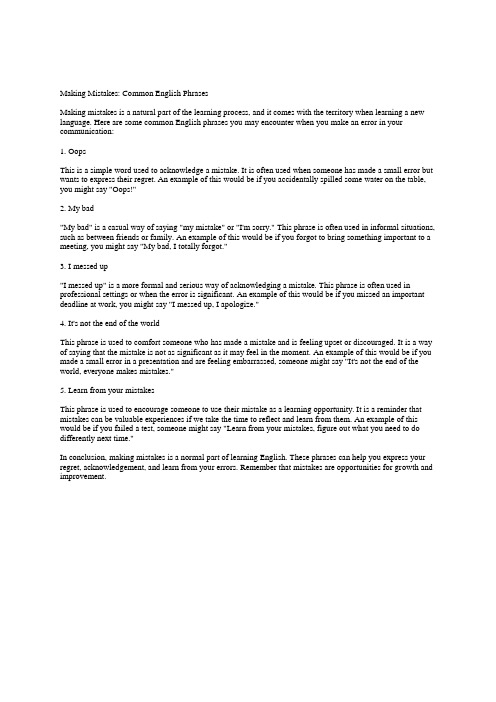
Making Mistakes: Common English PhrasesMaking mistakes is a natural part of the learning process, and it comes with the territory when learning a new language. Here are some common English phrases you may encounter when you make an error in your communication:1. OopsThis is a simple word used to acknowledge a mistake. It is often used when someone has made a small error but wants to express their regret. An example of this would be if you accidentally spilled some water on the table, you might say "Oops!"2. My bad"My bad" is a casual way of saying "my mistake" or "I'm sorry." This phrase is often used in informal situations, such as between friends or family. An example of this would be if you forgot to bring something important to a meeting, you might say "My bad, I totally forgot."3. I messed up"I messed up" is a more formal and serious way of acknowledging a mistake. This phrase is often used in professional settings or when the error is significant. An example of this would be if you missed an important deadline at work, you might say "I messed up, I apologize."4. It's not the end of the worldThis phrase is used to comfort someone who has made a mistake and is feeling upset or discouraged. It is a way of saying that the mistake is not as significant as it may feel in the moment. An example of this would be if you made a small error in a presentation and are feeling embarrassed, someone might say "It's not the end of the world, everyone makes mistakes."5. Learn from your mistakesThis phrase is used to encourage someone to use their mistake as a learning opportunity. It is a reminder that mistakes can be valuable experiences if we take the time to reflect and learn from them. An example of this would be if you failed a test, someone might say "Learn from your mistakes, figure out what you need to do differently next time."In conclusion, making mistakes is a normal part of learning English. These phrases can help you express your regret, acknowledgement, and learn from your errors. Remember that mistakes are opportunities for growth and improvement.。
容易理解错的英文短语
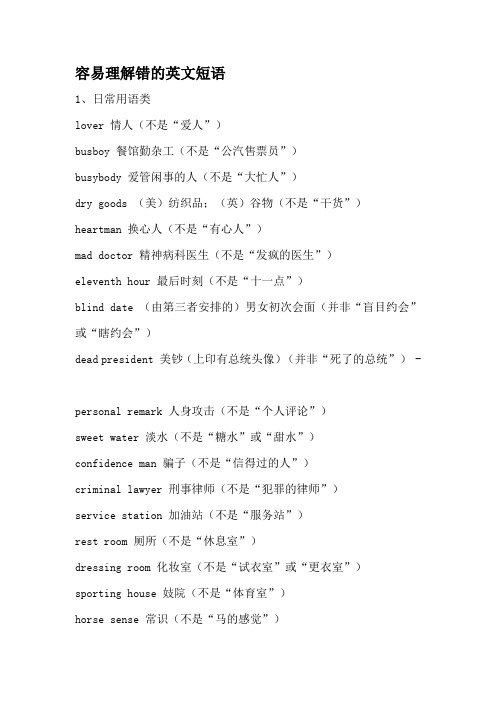
容易理解错的英文短语1、日常用语类lover 情人(不是“爱人”)busboy 餐馆勤杂工(不是“公汽售票员”)busybody 爱管闲事的人(不是“大忙人”)dry goods (美)纺织品;(英)谷物(不是“干货”)heartman 换心人(不是“有心人”)mad doctor 精神病科医生(不是“发疯的医生”)eleventh hour 最后时刻(不是“十一点”)blind date (由第三者安排的)男女初次会面(并非“盲目约会”或“瞎约会”)dead president 美钞(上印有总统头像)(并非“死了的总统”) -personal remark 人身攻击(不是“个人评论”)sweet water 淡水(不是“糖水”或“甜水”)confidence man 骗子(不是“信得过的人”)criminal lawyer 刑事律师(不是“犯罪的律师”)service station 加油站(不是“服务站”)rest room 厕所(不是“休息室”)dressing room 化妆室(不是“试衣室”或“更衣室”)sporting house 妓院(不是“体育室”)horse sense 常识(不是“马的感觉”)capital idea 好主意(不是“资本主义思想”)familiar talk 庸俗的交谈(不是“熟悉的谈话”)black tea 红茶(不是“黑茶”)black art 妖术(不是“黑色艺术”)black stranger 完全陌生的人(不是“陌生的黑人”)white coal (作动力来源用的)水(不是“白煤”)white man 忠实可靠的人(不是“皮肤白的人”)yellow book 黄皮书(法国政府报告书,以黄纸为封)(不是“黄色书籍”)red tape 官僚习气(不是“红色带子”)green hand 新手(不是“绿手”)blue stocking 女学者、女才子(不是“蓝色长统袜”)China policy 对华政策(不是“中国政策”)Chinese dragon 麒麟(不是“中国龙”)American beauty 红蔷薇(不是“美国美女”)English disease 软骨病(不是“英国病”)Indian summer 愉快宁静的晚年(不是“印度的夏日”)Greek gift 害人的礼品(不是“希腊礼物”)Spanish athlete 吹牛的人(不是“西班牙运动员”)French chalk 滑石粉(不是“法国粉笔”)2.成语类pull one's leg 开玩笑(不是“拉后腿”)in one's birthday suit 赤身裸体(不是“穿着生日礼服”)eat one's words 收回前言(不是“食言”)an apple of love 西红柿(不是“爱情之果”)handwriting on the wall 不祥之兆(不是“大字报”)bring down the house 博得全场喝彩(不是“推倒房子”)have a fit 勃然大怒(不是“试穿”)make one's hair stand on end 令人毛骨悚然—恐惧(不是“令人发指——气愤”)be taken in 受骗,上当(不是“被接纳”)think a great deal of oneself 高看或看重自己(不是“为自己想得很多”)pull up one's socks 鼓起勇气(不是“提上袜子”)have the heart to do (用于否定句)忍心做……不是“有心做”或“有意做”)3.表达方式类Look out! 当心!(不是“向外看”)What a shame! 多可惜!真遗憾!(不是“多可耻”)You don't say! 是吗!(不是“你别说”)You can say that again! 说得好!(不是“你可以再说一遍”)I haven't slept better. 我睡得好极了。
易误解的英文词组
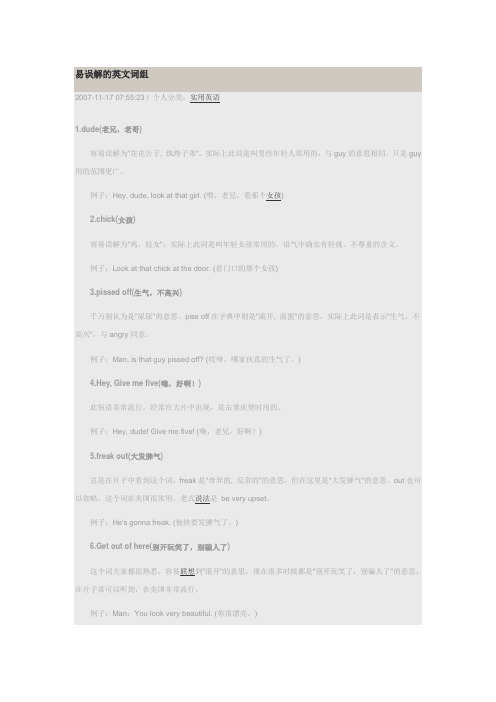
易误解的英文词组2007-11-17 07:55:23 / 个人分类:实用英语1.dude(老兄,老哥)容易误解为"花花公子, 纨绔子弟",实际上此词是叫男性年轻人常用的,与guy的意思相同,只是guy 用的范围更广。
例子:Hey, dude, look at that girl. (喂,老兄,看那个女孩)2.chick(女孩)容易误解为"鸡,妓女",实际上此词是叫年轻女孩常用的,语气中确实有轻佻、不尊重的含义。
例子:Look at that chick at the door. (看门口的那个女孩)3.pissed off(生气,不高兴)千万别认为是"尿尿"的意思。
piss off在字典中则是"滚开, 滚蛋"的意思,实际上此词是表示"生气,不高兴",与angry同意。
例子:Man, is that guy pissed off? (哎呀,哪家伙真的生气了。
)4.Hey, Give me five(嗨,好啊!)此短语非常流行,经常在大片中出现,是击掌庆贺时用的。
例子:Hey, dude! Give me five! (嗨,老兄,好啊!)5.freak out(大发脾气)总是在片子中看到这个词,freak是"奇异的, 反常的"的意思,但在这里是"大发脾气"的意思。
out也可以省略,这个词在美国很常用,老式说法是be very upset。
例子:He's gonna freak. (他快要发脾气了。
)6.Get out of here(别开玩笑了,别骗人了)这个词大家都很熟悉,容易联想到"滚开"的意思,现在很多时候都是"别开玩笑了,别骗人了"的意思,在片子常可以听到,在美国非常流行。
例子:Man:You look very beautiful. (你很漂亮。
中国学生在英文写作中最容易犯的典型错误2

中国学生在英文写作中最容易犯的典型错误G.把状语从句或短语单独成句,破坏了句子的完整性。
(Some students show their natural inclination to write incomplete sentences by punctuating some adverbial clauses or phrases into sentences.)【例1】“Is honesty out of date?” Many people may ask.My answer is “no”.Because honesty is not a single social phenomenon but rather, a kind of humanity rooted in our mind.(×) “Is honesty out of date?” Many people may ask.My answer is “no”,because honesty is not a single social phenomenon but rather, a kind of humanity rooted in our mind.(√)【例2】Traffic is very bad in this city.Particularly in its downtown area.(×)Traffic is very bad in this city, particularly in its downtown area.(√)【例3】And then there is no need worrying you‟11 be lost in a new place,if you have a cellphone.Especially, in some urgent situations.(×)And then there is no need worrying you‟11 be lost in a new place if you have a cellphone,especially in some urgent situations.(√)H.不会使用“there be”结构。
(完整版)英语短语大全

易译错的23个英文短语1.bank holiday不是银行节,是公共假期2.bookmaker不一定是图书业者,有可能是接受赌注的庄家ing of age不是时代来临,而是成年4.crow's feet不是乌鸦脚,而是鱼尾纹5.drawing room不是画室,而是客厅6.living room就是客厅,在英国又称之为 sitting room7.flat-footed不是扁平足,有可能是手足无措。
8.fourth estate不是第四笔地产,是指记者或新闻界9.full of beans不是到处都是豆子,是精力充沛。
不过在美国俚语中另有“错误连篇”的意思10.gray matter不是灰色的东西,是大脑皮层表面的灰质。
大脑里面是白质也就是 whitematter.11.green bean不是绿豆,是四季豆12.hard shoulder不是硬肩膀,是路肩13.headhunt不再是从前食人族的猎头陋习,而是当前流行的“挖角”行为14.heavy duty不是责任重大,是耐用15.hobby horse不是爱马是别人早就听腻,自己却乐此不疲的话题(hobby:—艘译为嗜好,但其实跟中文的嗜好有些不同。
hobby 必须是正面的,花时闲去培养的休闲活动,看电视逛街都不算,骑马 horseback riding 可算是一种 hobby)16.industrial action不是工业行动,是罢工之娄的手段bour of love不是为情所困,是为了兴趣嗜好而无怨无悔做的事k run不是牛奶用光了,是旅行搭的飞机或火车停很多站19.moonshine不一定是月光,也目私酒,或馊主意20.mug shot不是被马克怀击中,是拍照存档21.on the couch不一定是坐在沙发上,是看心理医师22.free shipping不是免费“偷渡”,而是免费邮寄英语短句1. I wasn't born yesterday.(我又不是三岁小孩)2. How do I address you?( 我怎么称呼你)3. She turns me off.( 她使我厌烦。
翻译技巧:汉译英最易翻错的100句(5)
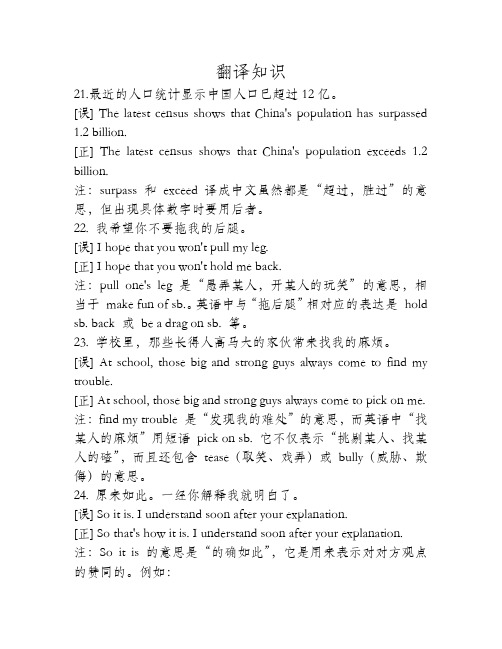
翻译知识21.最近的人口统计显示中国人口已超过12亿。
[误] The latest census shows that China's population has surpassed 1.2 billion.[正] The latest census shows that China's population exceeds 1.2 billion.注:surpass 和exceed 译成中文虽然都是“超过,胜过”的意思,但出现具体数字时要用后者。
22. 我希望你不要拖我的后腿。
[误] I hope that you won't pull my leg.[正] I hope that you won't hold me back.注:pull one's leg 是“愚弄某人,开某人的玩笑”的意思,相当于make fun of sb.。
英语中与“拖后腿”相对应的表达是hold sb. back 或be a drag on sb. 等。
23. 学校里,那些长得人高马大的家伙常来找我的麻烦。
[误] At school, those big and strong guys always come to find my trouble.[正] At school, those big and strong guys always come to pick on me. 注:find my trouble 是“发现我的难处”的意思,而英语中“找某人的麻烦”用短语pick on sb. 它不仅表示“挑剔某人、找某人的碴”,而且还包含tease(取笑、戏弄)或bully(威胁、欺侮)的意思。
24. 原来如此。
一经你解释我就明白了。
[误] So it is. I understand soon after your explanation.[正] So that's how it is. I understand soon after your explanation. 注:So it is 的意思是“的确如此”,它是用来表示对对方观点的赞同的。
必须会的英文短语
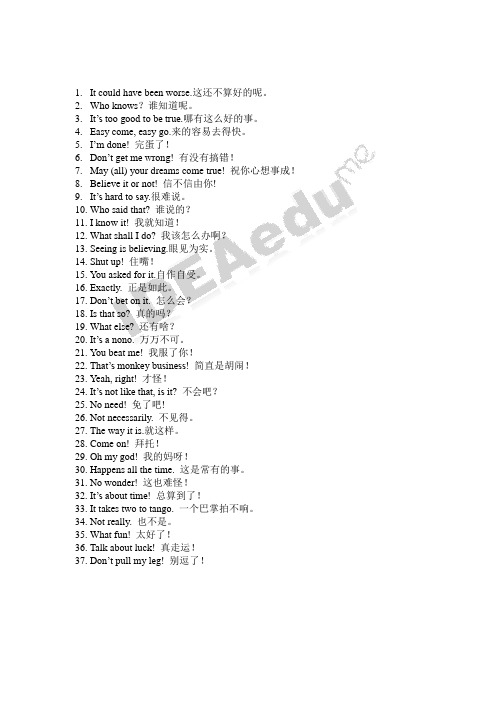
1.It could have been worse.这还不算好的呢。
2.Who knows?谁知道呢。
3.It’s too good to be true.哪有这么好的事。
4.Easy come, easy go.来的容易去得快。
5.I’m done! 完蛋了!6.Don’t get me wrong! 有没有搞错!7.May (all) your dreams come true! 祝你心想事成!8.Believe it or not! 信不信由你!9.It’s hard to say.很难说。
10.Who said that? 谁说的?11.I know it! 我就知道!12.What shall I do? 我该怎么办啊?13.Seeing is believing.眼见为实。
14.Shut up! 住嘴!15.You asked for it.自作自受。
16.Exactly. 正是如此。
17.Don’t bet on it. 怎么会?18.Is that so? 真的吗?19.What else? 还有啥?20.It’s a nono. 万万不可。
21.You beat me! 我服了你!22.That’s monkey business! 简直是胡闹!23.Yeah, right! 才怪!24.It’s not like that, is it? 不会吧?25.No need! 免了吧!26.Not necessarily. 不见得。
27.The way it is.就这样。
e on! 拜托!29.Oh my god! 我的妈呀!30.Happens all the time. 这是常有的事。
31.No wonder! 这也难怪!32.It’s about time! 总算到了!33.It takes two to tango. 一个巴掌拍不响。
34.Not really. 也不是。
笨手笨脚的英文短语

笨手笨脚的英文短语【最新版】目录1.笨手笨脚的英文短语的含义和用法2.常用的笨手笨脚的英文短语3.如何使用笨手笨脚的英文短语正文1.笨手笨脚的英文短语的含义和用法笨手笨脚的英文短语通常用来形容一个人在执行某种任务或活动时手脚不灵活、动作笨拙、缺乏协调性。
这些短语通常带有一定的幽默或讽刺成分,可以用来自嘲或嘲笑别人。
在英语中,描述这种状态的短语有很多,如“clumsy”,“awkward”,“botched”等。
2.常用的笨手笨脚的英文短语以下是一些常用的描述笨手笨脚的英文短语:- All thumbs: 这个短语形象地表示一个人手忙脚乱、笨手笨脚的样子。
- Clumsy: 形容一个人行动不协调,容易出错。
- Awkward: 形容一个人手脚不灵活、行动笨拙。
- Botched: 形容一个人把事情搞砸了,做事不灵活。
- Fumble: 形容一个人在处理某件事情时,由于紧张或不熟练而犯错。
- Bungle: 形容一个人把事情搞得一团糟,做事不得要领。
3.如何使用笨手笨脚的英文短语在日常生活中,我们可以使用这些短语来自嘲或者调侃别人。
例如,当你不小心打翻了水杯,你可以说:“I"m all thumbs today.(今天我一定是手忙脚乱。
)”或者“I guess I was being clumsy.(我想我刚才真是笨手笨脚了。
)”。
你也可以用这些短语来形容别人,例如:“He"s always botching things up.(他总是把事情搞砸。
)”或者“She"s so awkward, she can"t even walk straight.(她真笨拙,连路都走不直。
)”。
总之,了解并学会使用这些描述笨手笨脚的英文短语,不仅可以丰富你的词汇量,还能让你更准确地表达自己的感受和观察。
- 1、下载文档前请自行甄别文档内容的完整性,平台不提供额外的编辑、内容补充、找答案等附加服务。
- 2、"仅部分预览"的文档,不可在线预览部分如存在完整性等问题,可反馈申请退款(可完整预览的文档不适用该条件!)。
- 3、如文档侵犯您的权益,请联系客服反馈,我们会尽快为您处理(人工客服工作时间:9:00-18:30)。
1.词汇类
lover 情人(不是“爱人”)
busboy 餐馆勤杂工(不是“公汽售票员”)
busybody 爱管闲事的人(不是“大忙人”)
dry goods (美)纺织品;(英)谷物(不是“干货”)
heartman 换心人(不是“有心人”)
mad doctor 精神病科医生(不是“发疯的医生”)
eleventh hour 最后时刻(不是“十一点”)
blind date (由第三者安排的)男女初次会面(并非“盲目约会”或“瞎约会”)dead president 美钞(上印有总统头像)(并非“死了的总统”)
personal remark 人身攻击(不是“个人评论”)
sweet water 淡水(不是“糖水”或“甜水”)
confidence man 骗子(不是“信得过的人”)
criminal lawyer 刑事律师(不是“犯罪的律师”)
service station 加油站(不是“服务站”)
rest room 厕所(不是“休息室”)
dressing room 化妆室(不是“试衣室”或“更衣室”)
sporting house 妓院(不是“体育室”)
horse sense 常识(不是“马的感觉”)
capital idea 好主意(不是“资本主义思想”)
familiar talk 庸俗的交谈(不是“熟悉的谈话”)
black tea 红茶(不是“黑茶”)
black art 妖术(不是“黑色艺术”)
black stranger 完全陌生的人(不是“陌生的黑人”)
white coal (作动力来源用的)水(不是“白煤”)
white man 忠实可靠的人(不是“皮肤白的人”)
yellow book 黄皮书(法国政府报告书,以黄纸为封)(不是“黄色书籍”)
red tape 官僚习气(不是“红色带子”)
green hand 新手(不是“绿手”)
blue stocking 女学者、女才子(不是“蓝色长统袜”)
China policy 对华政策(不是“中国政策”)
Chinese dragon 麒麟(不是“中国龙”)
American beauty 红蔷薇(不是“美国美女”)
English disease 软骨病(不是“英国病”)
Indian summer 愉快宁静的晚年(不是“印度的夏日”)
Greek gift 害人的礼品(不是“希腊礼物”)
Spanish athlete 吹牛的人(不是“西班牙运动员”)
French chalk 滑石粉(不是“法国粉笔”)
2.成语类
pull one's leg 开玩笑(不是“拉后腿”)
in one's birthday suit 赤身裸体(不是“穿着生日礼服”)
eat one's words 收回前言(不是“食言”)
an apple of love 西红柿(不是“爱情之果”)
handwriting on the wall 不祥之兆(不是“大字报”)
bring down the house 博得全场喝彩(不是“推倒房子”)
have a fit 勃然大怒(不是“试穿”)
make one's hair stand on end 令人毛骨悚然—恐惧(不是“令人发指——气愤”)
be taken in 受骗,上当(不是“被接纳”)
think a great deal of oneself 高看或看重自己(不是“为自己想得很多”)
pull up one's socks 鼓起勇气(不是“提上袜子”)
have the heart to do (用于否定句)忍心做……不是“有心做”或“有意做”)
3.表达方式类
Look out! 当心!(不是“向外看”)
What a shame! 多可惜!真遗憾!(不是“多可耻”)
You don't say! 是吗!(不是“你别说”)
You can say that again! 说得好!(不是“你可以再说一遍”)
I haven't slept better. 我睡得好极了。
(不是“我从未睡过好觉”)
You can't be too careful in your work. 你工作越仔细越好。
(不是“你工作不能太仔细”)
It has been 4 years since I smoked. 我戒烟4年了。
(不是“我抽烟4年了”)
All his friends did not turn up. 他的朋友没全到。
(不是“他的朋友全没到”)
People will be long forgetting her. 人们在很长时间内会记住她的。
(不是“人们会永远忘记她”)
He was only too pleased to let them go. 他很乐意让他们走。
(不是“他太高兴了,不愿让他们走”)
It can't be less interesting. 它无聊极了。
(不是“它不可能没有趣”)。
